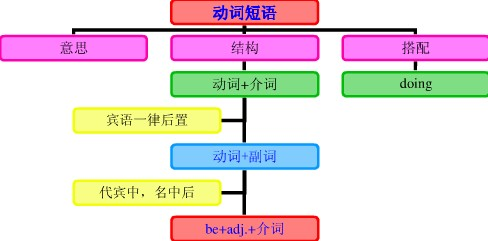本试题 “So difficult _______ that no one could ______ a good solution to it. [ ]A. was the problem; come up withB. the problem was; come up withC. the prob...” 主要考查您对动词短语
部分倒装
等考点的理解。关于这些考点您可以点击下面的选项卡查看详细档案。
- 动词短语
- 部分倒装
动词短语的概念:
动词常和某些其他词类用在一起,构成固定词组,形成所谓短语动词(phrasalverb)。和动词一样,短语动词也可分为及物和不及物两种。短语动词可以作为一个整体看待,同一般动词一样使用。
动词短语的搭配类型:
1)动词+介词:这类短语动词用作及物动词,后面须跟宾语。
如:The small boy insisted on going with his parents. 那男孩坚持要跟父母一起去。
Do you often listen to broadcasts in English? 你常听英语广播吗?
Look at the children. Aren't they lovely? 看着这些孩子们。他们多么可爱呀!
We stand for self-reliance. 我们是主张自力更生的。
这一类的短语动词还有很多,如depend on(upon)(依靠),wait on(服侍),look for(寻找),deal with(对待),look after(照料),wait for(等待)等。
2)动词+副词:
这类短语动词有的用作及物动词,有的用作不及物动词。
如:I always get up as soon as the bell rings. 我总是一打铃就起床。(不及物)
Look out, there's a car coming! 当心,来汽车了!(不及物)
Have you handed in your exercises already? 你已经交练习了吗?(及物)
Please don't forget to put on your coat, it's cold outside. 请不要忘记穿外衣,外面很冷。(及物)
这一类的短语动词还有很多,及物如put out(扑灭),eat up(吃光),put down(放下);不及物如set off(出发),come up(走近),go on(继续)。
注:"动词+副词"这类短语动词和上面第一类"动词+介词"的不同之处在于:"动词+介词"用作及物动词,后面须跟宾语。"动词+副词"则有的及物,有的不及物;用作及物动词而宾语为人称代词或自身代词时,副词往往放在宾语之后。
如:Please wake me up at five tomorrow. 请在明天早上五点唤醒我。
If you have done your exercises, please hand them in. 如果你们练习做完了请交来。
She doesn't normally behave like that, she's putting it on. 她通常并不如此表现,她是装出来的。
注:这类短语动词有不少可兼作及物和不及物动词用。
如:He took off his hat when he entered the office. 他进办公室后脱下帽子。(及物)
The plane took off at seven sharp. 飞机在七点整起飞。(不及物)
Charlie rang up Neil to ask about the time of the meeting. 查理打电话给尼尔问开会的时间。(及物)
If you can't come, please ring up and let us know. 你如来不了,请来电话告诉我们一声。(不及物)
3)动词+副词+介词:
"动词+副词"之后有的可以再加一个介词,形成另一种短语动词。这类短语动词用作及物动词。
如:Do not give up hope. We must go on with the experiment 不要失望。我们必须继续试验。(go on with继续)
He came up to me. 他走到我跟前。(come up to走近)
这类短语动词还有:look down upon(看不起),do away with(去掉),put up with(忍受)等。
4)动词+名词+介词:
这类短语动词也是及物的。
如:He shook hands with all the guests at the banquet. 他在宴会上和宾客一一握手。
Young pioneers often come to the Children's Palace to take part in after school activities.少先队员经常到少年宫来参加课外活动。
Pay attention to the temperature of the stored rice. 注意仓库里的稻谷的温度。
Her job is taking care of the babies. 她的工作是照顾婴儿。
这一类短语动词还有:put an end to(结束),take notice of(注意),catch hold of(抓住),lose sight of(看不见),make use of(利用)等。
动词短语知识体系:

部分倒装的概念:
倒装英语句子的主语通常位于谓语动词之前,这种语序被称为正常语序。但有时出于修辞或某种特殊的语法结构的需要,需要将谓语动词放在主语之前,这种语序则叫倒装语序。主语和助动词倒置叫部分倒装。
部分倒装:
1、含有否定意义的副词位于句首时的倒装:
在正式文体中,never, seldom, rarely, little, hardly, scarcely, no sooner, no longer, nowhere等含有否定意义的副词若位于句首,则其后要用部分倒装:
如:I shall never forgive him./ Never shall I forgive him. 我永远不会宽恕他。
He seldom goes out for dinner./Seldom does he go out for dinner. 他很少出去吃饭。
She hardly has time to listen to music./Hardly does she have time to listen to music. 他几乎没时间听音乐。
He little realize show important this meetingis./Little does he realize how important this meeting is. 他不甚明白这个会议的重要性。
We had no sooner reached the airport than the plane took off./No sooner had we reached the airport than the plane took off. 我们刚到机场,飞机就起飞了。
注:(1)对于not…until句型,当not until…位于句首时,其后的主句要用倒装语序:
如:He didn't leave the room until the rain stopped./Not until the rain stopped did he leave the room. 雨停了之后他才离开这房间。
(2)某些起副词作用的介词短语,由于含有否定词,若位于句首,其后要用部分倒装:
如:On no accounts must this switch be touched. 这个开关是绝不能触摸的。
In[Under] no circumstances will I lend money to him. 无论如何我也不会再借钱给他了。但是,in no time(立即,马上)位于句首时,其后无需用倒装语序:
如:In no time he worked out the problem. 他马上就算出了那道题。
2、“only+状语”位于句首时的倒装:
当一个状语受副词only的修饰且置于句首时,其后用部分倒装语序:
如:Only then did he realize that he was wrong. 到那时他才意识到他错了。
Only in this way are you able to do it well. 你只有用这种方法才能把它做好。
Only when he returned home did he realize what had happened. 当他回到家里时,才知道出了什么事。
3、“so+形容词或副词”位于句首时的倒装:
副词so后接形容词或副词位于句首时,其后用部分倒装:
如:So cold was the weather that we had to stay at home. 天气太冷,我们只好呆在家里。
So fast does light travel that we can hardly imagine its speed. 光速很快,我们几乎没法像它的速度。
So sudden was the attack that we had no time to escape. 袭击来得非常突然,我们来不及逃跑。
4、“So+助动词+主语”倒装:
当要表示前面提出的某一肯定的情况也同样适合于后者,通常就要用“So+助动词+主语”这种倒装结构:
如:You are young and so am I. 你年轻,我也年轻。
She likes music and so do I. 她喜欢音乐,我也喜欢。
If he can do it, so can I. 要是他能做此事,我也能。
注:(1)若前面提出某一否定的情况,要表示后者也属于同样的否定情况,则应将其中的so改为neither或nor:
如:You aren't young and neither am I. 你不年轻,我也不年轻。
She hasn't read it and nor have I. 她没有读它,我也没有读。
(2)注意该结构与表示强调或同意的“so+主语+特殊动词”结构的区别:
如:"It was cold yesterday." "So it was."“昨天很冷。”“的确很冷。”
"Father, you promised." "Well, so I did."“爸爸,你答应过的。”“嗯,是答应过。”
5、由not only…but also引出的倒装:
当not only…but also位于句首引出句子时,not only后的句子通常用部分倒装形式:
如:Not only is he a teacher, but he is also a poet. 他不仅是一位教师,而且是一位诗人。
Not only did he speak more correctly, but he spoke more easily. 不仅他讲得更正确,也讲得更不费劲了。
6、虚拟条件句省略if后构成的倒装:
当if引导的虚拟条件从句中含有had, were, should等时,如将if省略,则要将had, were, should等移到主语前,构成倒装句:
如:Had you come yesterday, you would have seen him. 若你昨天来,你就会见到他了。
Should you require anything give me a ring. 如果需要什么,可以给我打电话。
Were it not for your help, I would still be homeless. 要不是你帮助,我会仍然无家可归。
注:省略if后提前的had不一定是助动词:
如:Had I money, I would buy it. 假若我有钱,我就会买它。
发现相似题
与“So difficult _______ that no one could ______ a good solu...”考查相似的试题有:
- The professor________at 8 o’clock,but he has not shown up yet,which worries all of us.[ ]A.was supposed to arriveB...
- Some of the students have already learned enough English to ________ a conversation with a nativeEnglish speaker.[ ]A...
- I don’t like ______________the teacher shouts at the Children so unlkindly.A.the wayB.in the way thatC.in the wayD...
- Do you think 3,000 yuan is enough to ______ his needs for the tour to Beijing?A.costB.coverC.takeD.save
- ——Did your classmate accept your invitation?——No, he ____ refused.A.as far asB.as well asC.as soon asD.as good as
- The old man said that the accident _________ careless driving, so a lot of money _________ by the driver.A.due to; b...
- Mother was frying chicken and it smelled so nice that I couldn’t wait __________.A.to eat itB.eating itC.for eatin...
- Their bright eyes and smiling faces_______the impression that they were very excited.A.determinedB.conveyedC.shape...
- The computer was used in teaching. As a result, not only _______, but students became more interestedin the lessons.[...
- I failed in the final examination last term and only then _______ the importance of studies.A.I realizedB.I had re...